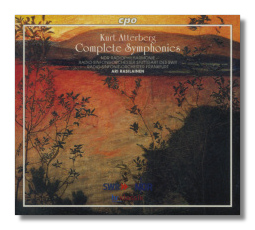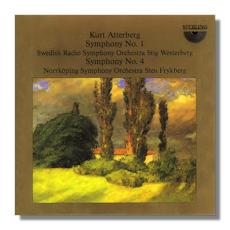
The Internet's Premier Classical Music Source
Related Links
-
Find CDs & Downloads
Amazon - UK - Germany - Canada - France - Japan
ArkivMusic - CD Universe
Find DVDs & Blu-ray
Amazon - UK - Germany - Canada - France - Japan
ArkivMusic-Video Universe
Find Scores & Sheet Music
Sheet Music Plus -
Recommended Links
Site News
Kurt Atterberg

(1887 - 1984)
Kurt Magnus Atterberg (December 12, 1887 - February 15, 1984), Swedish composer and conductor, studied cello before entering a technical college and graduating as a civil engineer. He began working in the patent office and stayed a very long time, avoiding mandatory retirement. They basically had to pry a very old Atterberg loose and toss him out. Nevertheless, with all of Atterberg's other activity, including foreign tours, conducting engagements, time for composition, and administrative duties of two organizations benefitting Swedish composers, that office had shown unbelievable understanding for many years. One can make the case for him as the most important Swedish symphonist between Wilhelm Stenhammar and Dag Wirén.
Atterberg began as a follower of the nationalist school of Hugo Alfvén. However, his commitment as a conductor, especially to new music, had pushed him past the post-Wagnerian and -Brahmsian procedures of Alfvén. He incorporated such advanced styles of the time as Impressionism and later polytonality. Nevertheless, he kept a nationalist, folklorist core in his music. His nine symphonies and certain choral-orchestral scores constitute his main achievement, the Sixth Symphony (1928) received a cash prize from the Columbia Gramophone Company and was known from then on as the "Dollar Symphony." Critics fight over which of his symphonies is his best. I like them all, although they don't reach the level of any Carl Nielsen or Jean Sibelius symphony. My current favorite is the Ninth, the "Sinfonia visionaria," a vision of the world's creation, destruction, and rebirth. It's a big topic, full of opportunities for musical bloviating, but Atterberg creates incisive, vigorous music from it.
Atterberg became increasingly isolated and bitter after the war. He had little sympathy for the new music, and in general the younger composers and writers tended to ignore him. When he died in the early Eighties, the reaction of many must have been surprise, since they thought he had died long before. In recent years, however, his stock has risen a bit, and the CPO label has issued a stunning release of his complete symphonies. ~ Steve Schwartz
Recommended Recordings
 Symphonies #1-9
Symphonies #1-9
- Complete Symphonies, Älven/CPO 777118-2
-
Satu Vihavainen (soprano), Gabriel Suovanen (baritone), Ari Rasilainen/Frankfurt Radio Symphony Orchestra, Hannover Radio Philharmonic Orchestra, Stuttgart Radio Symphony Orchestra, North German Philharmonic Orchestra,
Prague Chamber Chorus, North German Philharmonic Chorus
Amazon - UK - Germany - Canada - France - Japan - ArkivMusic - CD Universe
Or avalable separately,
Symphonies #1 & 4 - CPO 999639-2
Amazon - UK - Germany - Canada - France - Japan
Symphonies #2 & 5 - CPO 999565-2
Amazon - UK - Germany - Canada - France - Japan
Symphonies #3 & 6 - CPO 999640-2
Amazon - UK - Germany - Canada - France - Japan
Symphonies #7 & 8 - CPO 999641-2
Amazon - UK - Germany - Canada - France - Japan
Symphony #9, Älven - CPO 999913-2
Amazon - UK - Germany - Canada - France - Japan - ArkivMusic - CD Universe - Symphony #1, Op. 3 & Symphony #4 "Sinfonia Piccola", Op. 14/Sterling CDS-1010-2
-
Stig Westerberg/Swedish Radio Symphony Orchestra & Sten Frykberg/Norrköping Symphony Orchestra
- Symphony #2, Op. 6, Suite #3 for Violin, Viola & String Orchestra, Op. 19/1/Swedish Society Discofil SCD1006
-
Swedish Radio Symphony Orchestra/Stig Westerberg
- Symphony #3 "West Coast Pictures", Op. 10; Horn Concerto, Op. 28/Caprice Musica Sveciae CAP21364
-
Stockholm Philharmonic Orchestra/Sixten Ehrling
- Symphony #6 "Dollar Symphony", Op. 31, Värmland Rhapsody, Ballad without words/BIS CD-553
-
Jun'ichi Hirokami/Norrköping Symphony Orchestra
- Symphony #7 "Sinfonia Romantica", Op. 45 & Symphony #8, Op. 48/Sterling CDS-1026-2
-
Michail Jurowski/Malmö Symphony Orchestra
Concertos
- work works
-
ensemble
- work works
-
ensemble
- work works
-
ensemble
Chamber Music
- work works
-
ensemble
- work works
-
ensemble
- work works
-
ensemble















